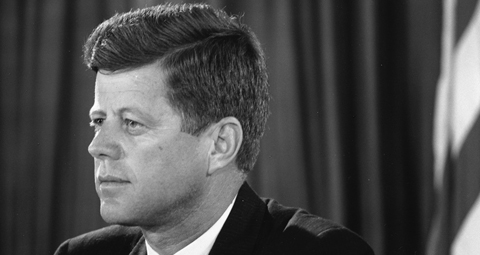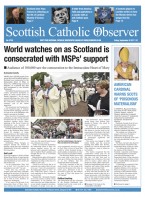September 8 | ![]() 0 COMMENTS
0 COMMENTS ![]() print
print

Reconciling patriotism and Faith
In a letter from America, BRANDON MCGINLEY examines Catholic identity and institutional prejudice —By BRANDON MCGINLEY
My affection for America was at its most ardent and least complicated when my Faith was at its lowest point. There was a time during high school when I carried around a volume of Ronald Reagan’s correspondence as if it were Scripture. I downloaded saccharine country-music and patriotic anthems. The photography studio photoshopped an American flag into the background of my high school senior portrait.
I would not have hesitated to tell you back then that my identity as an American superseded any other affiliation—even my identity as a (lapsed) Catholic. If I had recognised any conflicts between those identities, I would have resolved them in favour of my country.
But of course I did not recognise any such conflicts—not just because I wasn’t practising the Faith, but because most American Catholics see little tension between our loyalties to Washington and to Rome.
This is more than a historical anomaly: it would be seen by any Catholic from the colonial era through the mid-20th century as utterly bizarre. It’s not an exaggeration to say that anti-Catholicism is the oldest institutionalised prejudice in the United States; the first colonies banned Catholics long before the first African slaves were kidnapped to our shores.
19th century American politics was dominated by anti-Catholicism—including military aggression against our conspicuously Catholic southern neighbour.
The great political cartoonist Thomas Nast drew up some of the wittiest and wickedest anti-Catholic propaganda seen anywhere, perhaps since the French Revolution.
All the while, Pope Leo XIII condemned ‘Americanism,’ defined as politics based on indifference to religious truth, and poor Catholic immigrants tumbled on to American shores and into segregated ghettos.
In the early 1960s, however, all these tensions seemed to fade away. We elected a Catholic president, John F Kennedy, and though he famously promised Protestant ministers in Texas that he would check his Catholicism at the door to the White House, he was still ours.
And then there was the Second Vatican Council. The foreignness of the Mass evaporated into the vernacular and Dignitatis Humanae, on a superficial reading, seemed to endorse American-style religious liberty. America had embraced the Church, and the Church had embraced America. Finally, we were home.
It was into this world that I was born—a world where the Church seemed as American as hot dogs and home runs. My college-age ‘reversion,’ however, coincided with the beginning of an era of bad feelings between American authorities and faithful Catholics.
Same-sex marriage swept through the courts and the Obama administration seemed determined to chip away at the liberty of the Church that had been the cornerstone of Catholic confidence in the American arrangement. And now, of course, the present administration gives us no reason to be optimistic; the secularised American Right seems poised to oscillate between libertarianism and identitarianism as the preferred bulwark against progressivism, neither of which promise anything worthwhile to Catholics.
It soon became clear to me, as I plumbed deeper into Catholic tradition and history, that this last decade has not introduced new conflict into the relationship between Catholic truth and American ideals, but rather has uncovered a conflict both sides had papered over.
My co-religionist countrymen would do well to come to peace with the fact that we are not entering an aberration of discord but rather emerging from an aberration of largely illusory harmony.
It goes without saying that we are to resolve these conflicts in favour of Christ and His Church. But what does that mean?
For my part, I think I love America not more or less, but differently and maybe even better than I did in those old flag-waving days. When I regard a patriotic display, I do now feel a step removed from it, almost like a journalistic observer rather than a passionate participant. I can’t pretend the flag represents anything other than a secondary and contingent loyalty any longer.
But, more than ever before, I feel a special sense of pride and belonging in the distinctive culture of this distinctive place. I am moved by the music of the Appalachians and their foothills—bluegrass and folk and so forth—in a way I can’t be even by the most delicate European symphonies.
I find films that are deeply rooted in particular American places resonate with me in a way more cosmopolitan works do not. So, yes, I do love America. This patriotism—this embrace of a complicated but real American identity that complements rather than compromises my Catholic identity—is all the more poignant for its bittersweetness.











